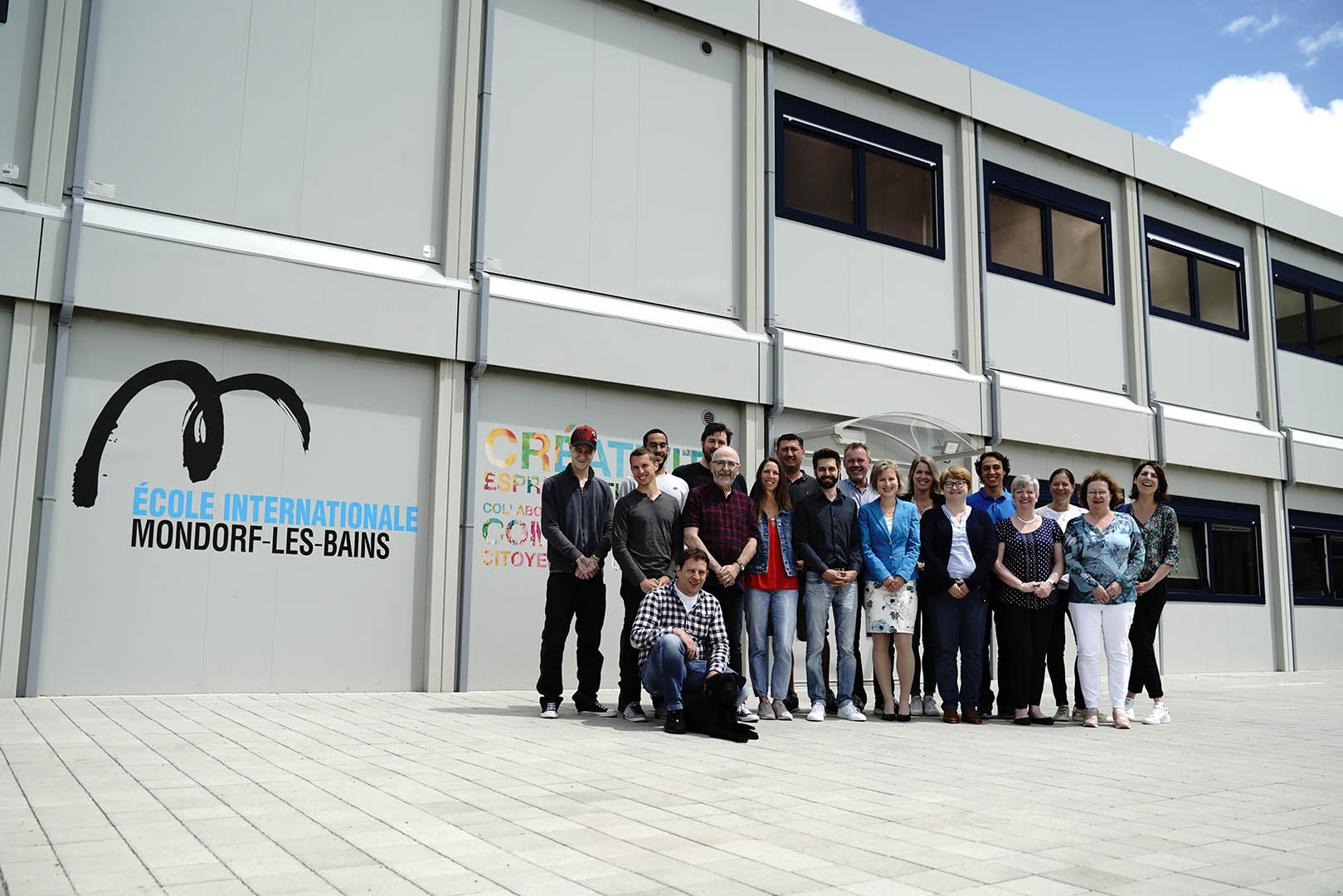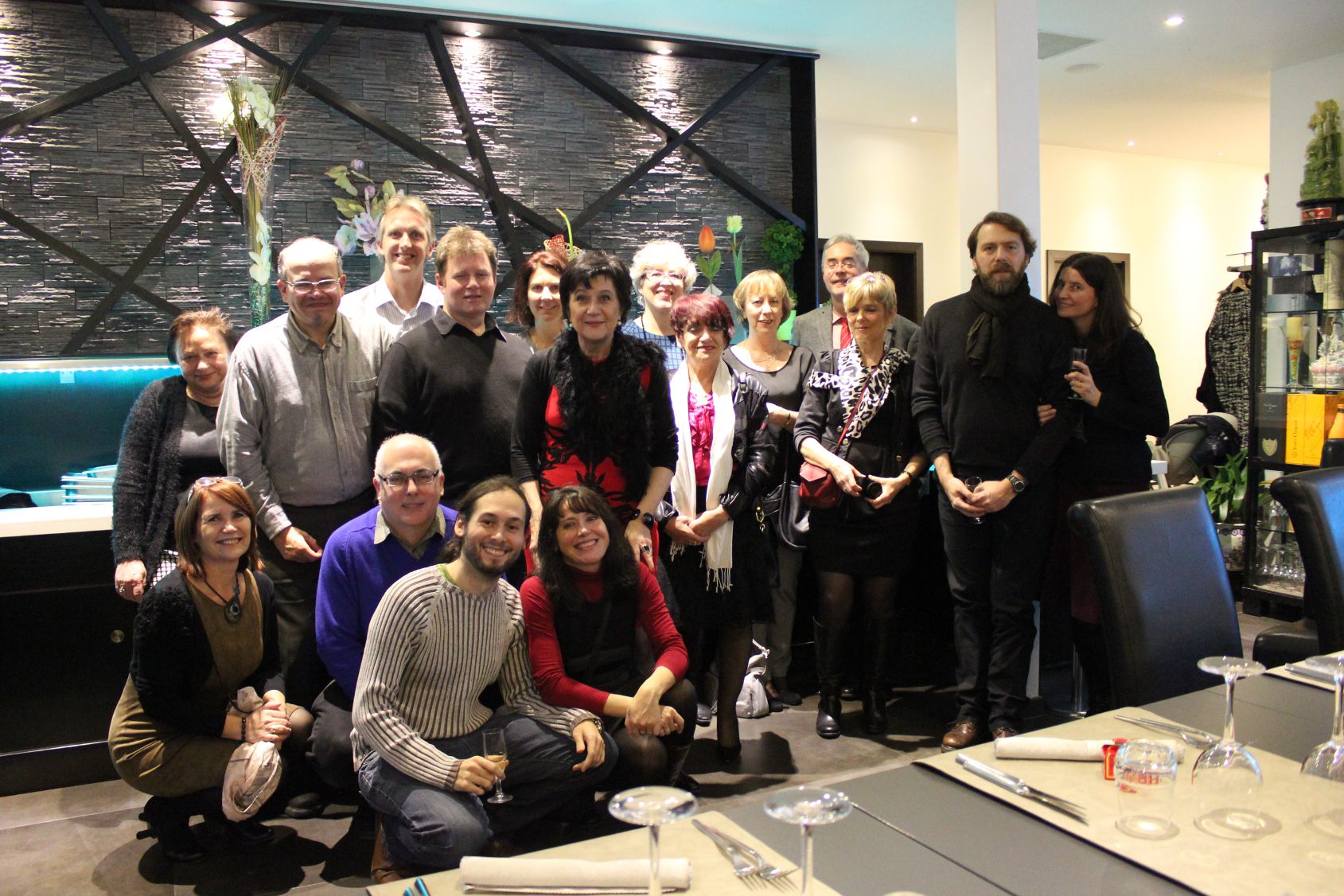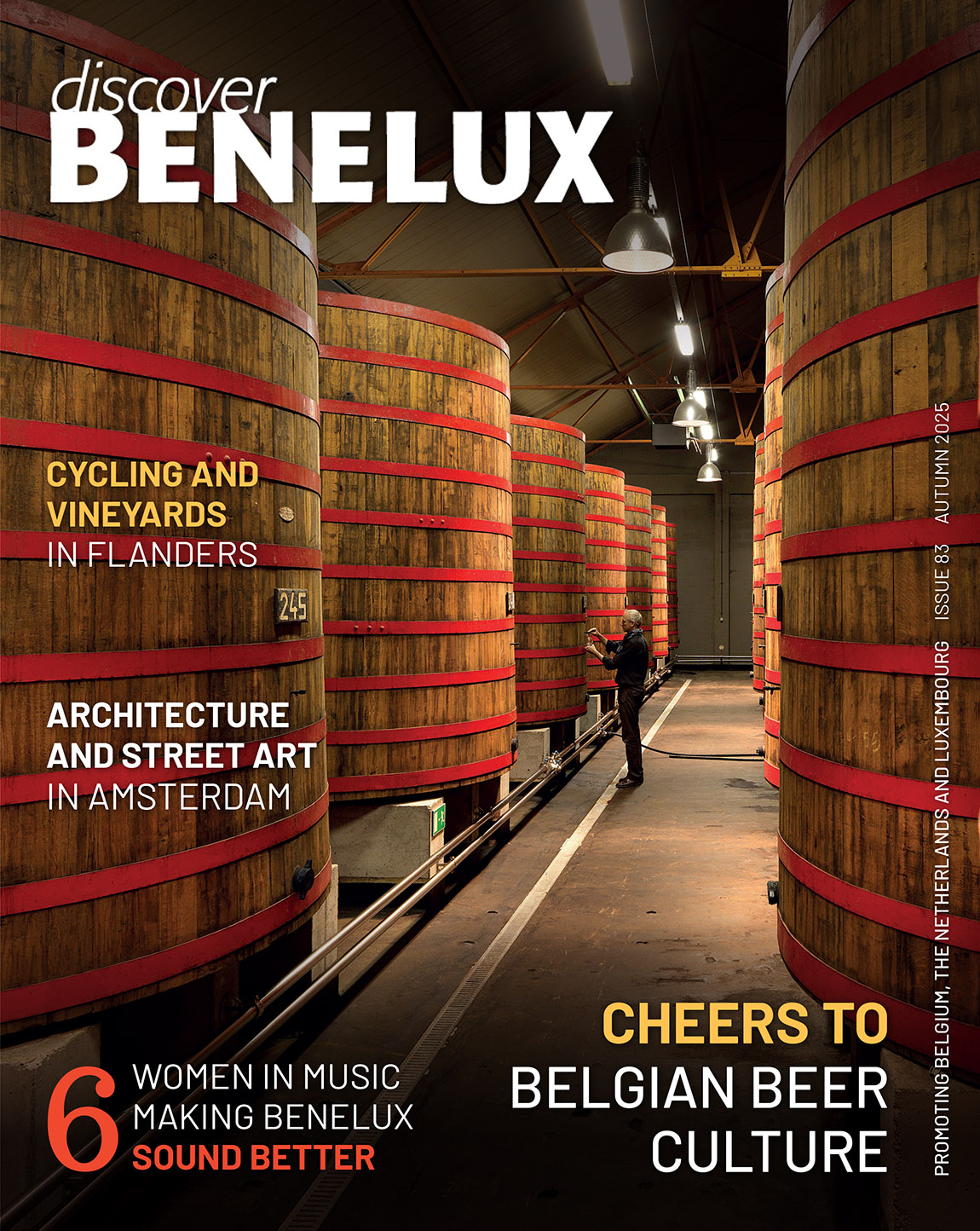École Internationale Mondorf-les-Bains (EIMLB): Putting community at the heart of multilingual learning
Text: Anna Villeleger | Photos © Eimlb / Patrik Bitomsky

Luxembourg is a diverse, vibrant country, which people of various nationalities call home. This multiculturalism is reflected nowhere better than at the École Internationale de Mondorf-les-Bains (EIMLB), situated in the country’s desirable Moselle region. The state-run international school, which is divided into a primary section (French and English) and secondary section (French, English and German), may have only opened in September last year, yet it has already earned a strong reputation, thanks not only to its pioneering pedagogical practices, but also due to the palpable sense of community amid pupils and staff.
EIMLB counts more than 20 nationalities among its student body, and is proud of its multi-cultural outlook. “We stress that each class should go for at least one pedagogical trip abroad per year. This could be skiing, or a visit to a major European city,” begins the school’s director Camille Weyrich.

Open to the world
The school follows the ‘European offer’, which was put into place by Luxembourg’s Minis-try of Education. The European offer is public, and aims for social, democratic and cultural integration, highlighting the position of the school as a social elevator and as the impetus of the European spirit.
“One of the strongest aspects of the European offer is the emphasis on language,” notes the director. As an ‘Accredited European School’, EIMLB offers the European Schools’ curriculum, which emphasises a multilingual and multicultural pedagogical approach. This leads to students leaving secondary school with the bilingual European Baccalaureate diploma.
In terms of languages, the EIMLB offers students several choices. In the first year of primary school there are two language sections: French and English. Except for language classes, all subjects are taught in the language of the section. Students choose their first language (learned at native level) from French, German, English and Portuguese. “This allows most students to use their native language at school,” explains the director. Stu-dents choose their second language from French, German and English.
In secondary school, students chooses a third language among French, German, English and Portuguese. Then, in the fourth year of secondary school, a fourth language is taught as an option. Learning Luxembourgish is also compulsory for all pupils in primary school, and in the lower classes of secondary school.

The Dalton Plan
In addition to the importance of language and communication, a major influence at EIMLB is the Dalton Plan, a teaching concept developed by American educator Helen Parkhurst (1887-1974). As a young teacher at a rural American school, Parkhurst was faced the challenge of having to teach a diverse range of students aged 4 to 14 in one class. Unable to meet the needs of each individual pupil using traditional teaching methods, Parkhurst created a course principle that allowed students to take ownership of content as independently and individually as possible, by working as often as possible in pairs, groups and autonomously. As Parkhurst discovered, when pupils follow their own interests, it has a huge influence on their individual rhythm and the learning success of each person. The school she founded in New York still exists to this day, and is one of the most esteemed schools in the United States, with an array of well-known names from the arts, business and law amid its alumni.
While there are similarities to the Maria Montessori’s child-centred educational approach, which is favoured in many primary schools, the Dalton Plan is especially well suited to in-dependent learning in secondary pupils, and has been implemented in schools across the world. “At EIMLB we embrace the principles of the Dalton Plan, while following our own path in its pedagogical design,” reveals Mr Weyrich. ‘Freedom within a framework’, responsibility, cooperation and autonomy all form the guidelines of education at EIMLB.

Collaboration
While more traditional courses are also followed at the school, students are introduced to independent learning and cooperation with their peers. The goal is to reduce classes where the teacher is the sole focus, with an increased emphasis on the individual interest of each student and their own learning process. “This means the role of the teacher be-comes less about providing discipline, and more about advising students in their learning.”
Pupils are encouraged to interact and work constructively together – collaboration is at the heart of the learning experience. “It’s about the pupils working to support each other. The focus shouldn’t be on the pupil as a ‘lone warrior’,” points out Mr Weyrich. Unlike traditional group work, students at EIMLB partake in a type of small group learning called ‘cooperative learning’, where each student has a responsibility for the group’s learning process. This creates a positive interdependency between the group members and has a positive effect on social interaction, as well as on the group’s academic results.
Courses at EIMLB are organised in blocks of double lessons, meaning the number of subjects per day is limited and providing pupils with the necessary time to deal with a topic in depth, to practice and to review. “Pupils will deal with no more than three to five topics per day, with lessons only ever featuring a maximum of 45-minutes worth of traditional teaching,” notes Mr Weyrich.

Putting students at the centre
For each six-week learning phase, teachers develop a detailed learning plan for their subjects and classes which can be customised for the particular needs of each student, depending on whether they are particularly gifted in one area or need extra help. “This approach really put child at the centre of their education, and gives them the time they need to get to grips with their learning. Some students need more time to focus on the basics, while others work faster and wouldn’t be challenged in a traditional lesson. The teacher can come up with special challenges for extra-performing students.”
Learning plans are primarily implemented in the form of disciplinary or interdisciplinary projects called assignments. For each objective, students have enough educational material to practice and also check for themselves to what extent they have mastered a certain subject. “Working autonomously gives the student the chance to see how well they have understood the lesson, and if they have any problems they can ask their teacher.”

Independence
The autonomy really comes in to play with the pupils’ self-study periods, which happen during 12 lessons per week. During these sessions, teachers remain in the classroom, while pupils have the opportunity to work independently or visit whichever teacher they may benefit from during that time. “This is a perfect opportunity for students who couldn’t keep up in the lesson to seek the support of their teacher. For example, a student could be advanced in English but require more support in maths, so during their autonomous session they could go to their maths teacher. This flexible timetable is a great way to cater for everyone without having to change the specific timetable,” enthuses the director.
Dalton Diary
Each learner is responsible for managing their own Dalton Diary, in which they can plan their individual learning process, plot their development goals and reflect on what they have learned at the end of each six-week period. Students are responsible for keeping their Dalton Diary up-to-date, and it forms an important link between teachers, students and parents.
Innovation
After a successful introduction of iPads in classes this year, September will see the end of traditional paper workbooks for secondary school pupils. “Of course handwriting will always be important, but technology will always be important too – even more so in the future. It has been astonishing how quickly both the teachers and students have adapted to the iPad. They soon lost all their fears.”
Personal harmony
Pupils at EIMLB are provided with a framework to ensure they develop their own sense of personal harmony. “We want to make sure students feel at ease at school,” insists the school’s assistant director Stephan Dumange. In the first three classes of secondary school, pupils are given their own ‘coach’ who they meet with every Friday to discuss any problems they might be having, as well as the positive aspects of their week. Furthermore, pupils have their own portfolio where they reflect in collaboration with their tutor on skills they have developed outside of traditional school subjects. This could be related to 21st-century skills such as problem-solving, critical thinking and collaboration. “This portfolio could prove to be more interesting to future employers than a student’s actual school results,” muses Mr Weyrich.

Democracy
Citizenship is a key focus too, and pupils here learn to have a democratic spirit from an early age. For example, two representatives from each class regularly meet at the School Parliament to debate issues affecting the school community and the evolution of the school. “A democratic approach is practiced everyday,” explains the director. “We want everyone to be involved in the processes and decisions that affect the school community.” The Parliament has a specific budget that it has to manage, helping pupils understand the importance of looking after finances. “It isn’t just a matter of teaching pupils about democratic structures, it’s about living within one,” points out Mr Weyrich. “The parliament offers us plenty of inspiration. When they have an idea about how things could be improved, we look to implement their feedback.” A class assembly also takes place every other week, providing pupils with an opportunity to address unanswered questions and discuss the needs of the class.

A school where tolerance flourishes
Being compassionate and understanding are fundamental pillars at EIMLB, reflected by the school’s annual Acceptance Day. “One of the primary goals of any school should be to teach pupils about tolerance, respect, and acceptance,” asserts Mr Weyrich. The first Acceptance Day took place on May 10, 2019, under the initiative of Mr Dumange. Pupils from both the primary cycle and the secondary cycle participated in Acceptance Day, with the school being transformed for half a day into a large platform of thematic workshops.
Working in groups, pupils considered a main theme to discuss from a list of suggested examples of intolerance such as xenophobia, homophobia and sexism, and gave presentations using a range of resources including video and PowerPoint. “Even between children of the same cultural origin, differences in socialisation can appear, depending on the family environment and the environmental conditions in which the child is growing up,” explains Mr Dumange. “If differences are not explored they can become misunderstood, and a cause of unconscious intolerances. So we decided that, once a year, we would have a day focusing on accepting the differences between all the types of people in the world.”

Self-expression
Creativity is nurtured at EIMLB, with pupils being encouraged to express themselves. One of the ways in which they are motivated to do this is by the many opportunities for extra-curricular activities. “These help the pupils discover personal interests, which could be intellectual, creative or sporty. Just some of the activities include chess, drama, archery, robotics, or working on the school magazine,” reveals the director.
Support service
All primary pupils can enrol at the school’s education and support service, SEA, which is located in the school building and is open Monday – Friday 7am – 7pm. The children are welcomed at SEA before classes begin, they then spend lunchtime there with the socio-educational staff and their classmates. Meanwhile, in the afternoon there are various extracurricular activities, as well as free play and the opportunity to receive help with home-work. “I used to say that in a ‘traditional’ school, life began when the bell rang at the end of the day. But we offer a full-day model from 7am to 7pm. Real life happens at school. It’s not all about academic activities, it’s about getting to know each other and developing interests,” enthuses Mr Weyrich.
During the school holidays, SEA remains open, organising various activities for the children including workshops, sports and excursions. “The children go on various outings around Luxembourg and the neighbouring countries. Today, for example, they have gone to the Eifel National Park in Germany,” smiles the director.

Finding their vocation
The secondary school also has a socio-educational service, MESA (which stands for Motivation, Education, Social, Accompanying) and organises socio-educations projects in close collaboration with the teachers, as well as coordinating extracurricular activities, and much more. A successful MESA scheme involves organising day-trips to specific locations related to pupils’ particular talents. These could be related to sport, technology or the arts. “This really helps foster students’ specific interests. It means everyone gets to know about ‘real life’ outside school,” concludes Mr Weyrich. “Our pupils gain a true understanding into how the world works.”
École Internationale Mondorf-les-Bains 2, route de Burmerange L-5659 Mondorf-les-Bains To find out more about EIMLB, visit: eimlb.lu
Subscribe to Our Newsletter
Receive our monthly newsletter by email



